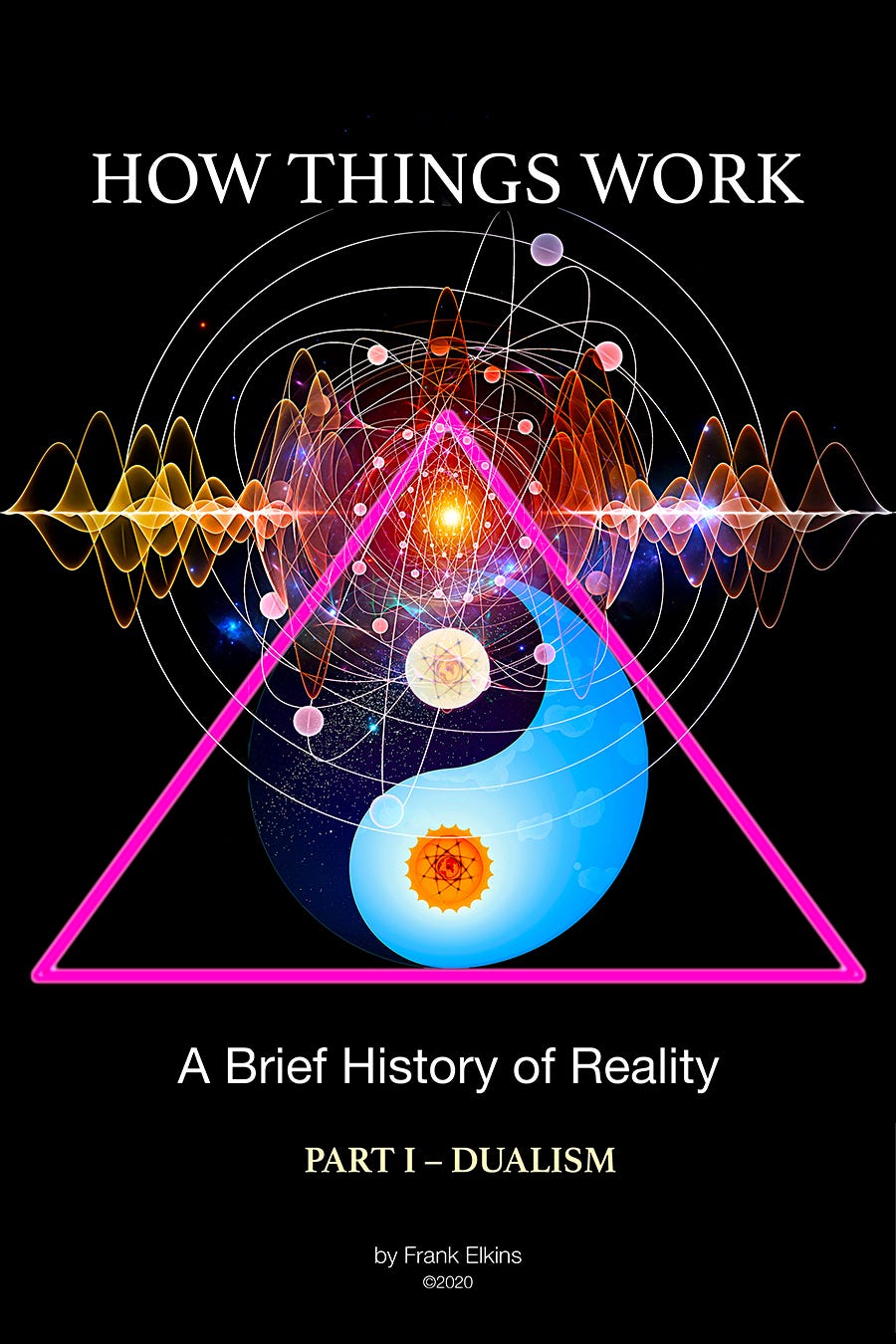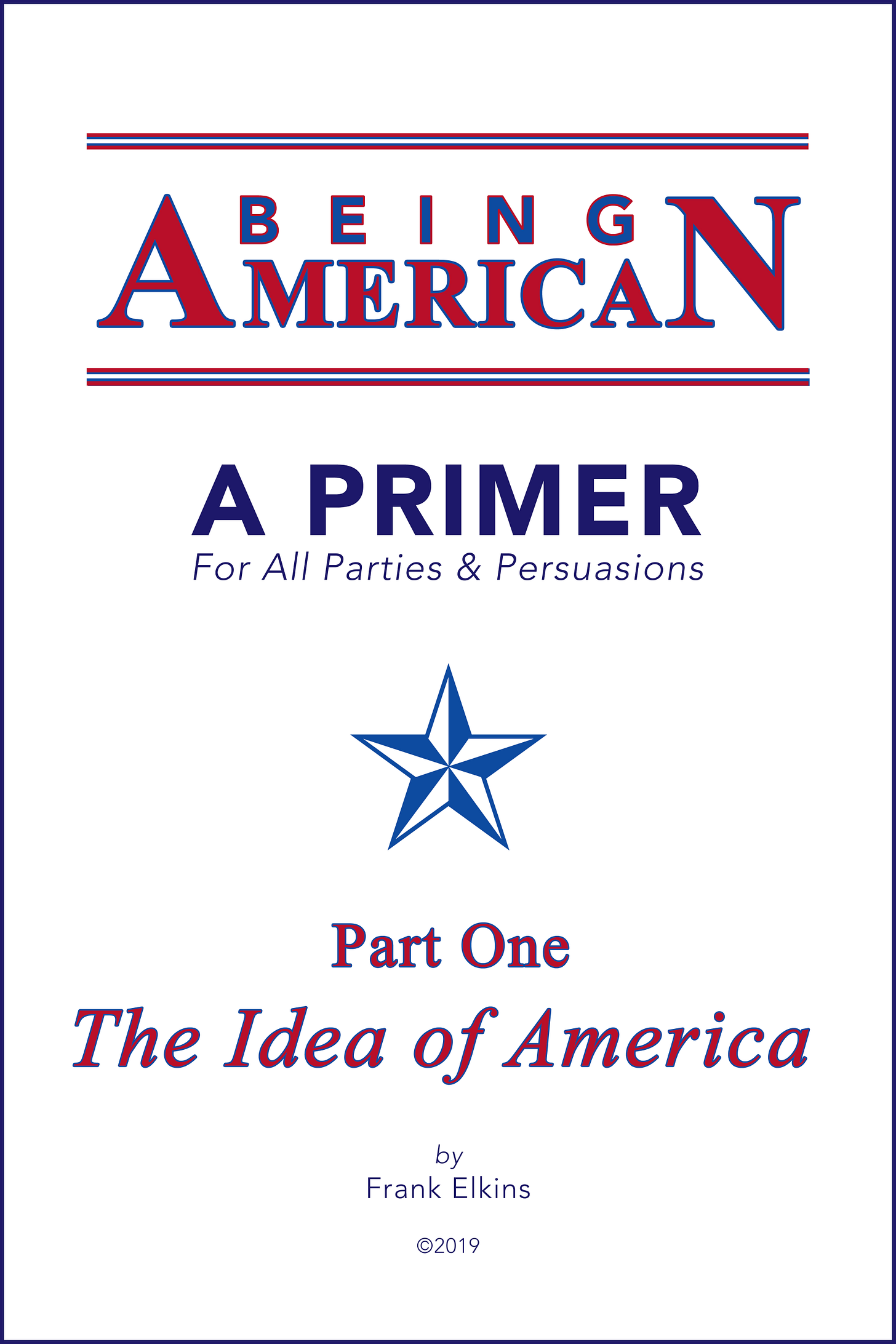How Things Work – A Brief History of Reality
Book I – Dualism (Western Virtues Part 2)
Be A Part of the Conversation!
Tuesday, December 7, 2021
"I have spent my life judging the distance between American reality and the American dream." – Bruce Springsteen
PREFACE
Welcome Everybody!
One of the most important things that separates Eastern and Western philosophy is the West’s focus on human intellect and intelligence, particularly in regard to reason. The idea that each human being has access to reason and intelligence is the foundation of human, or individual, rights. What makes human beings unique and special from all other animals is their ability to utilize reason, logic, and abstract thinking. This “higher” intelligence, or understanding, comes from an “a priori” knowledge outside of our physical world, from another dimension, such as the Realm of Forms, or another Being, such as God. Since every single human being has access to this “divine” knowledge or understanding, that means that every single human being shares in that “divinity.” Therefore, all human beings, or at least their souls, are sacred. This is the metaphysical construct behind the self-evident truth that all human beings are born equal. Every individual human being is born with the divine spark of reason, which leads to the next self-evident truth: that all human beings are therefore naturally endowed with the self-evident rights of life, liberty, and the pursuit of happiness as stated in the Declaration of Independence.
“The United States Constitution represents the first attempt at legally codifying the principles of these virtues into a just form of government.”
The historical outcome of the Greek Virtues was the Age of Reason, or The Enlightenment. The historical fruit of The Enlightenment was The United States of America. Enlightenment philosophers arguing for the virtues of Reason, Science, Religious Tolerance, and Natural Rights seeded the fertile ground of America, where they grew into the concepts of Deism, Liberalism, Republicanism, Conservatism, Toleration, and Scientific Progress. The United States Constitution represents the first attempt at legally codifying the principles of these virtues into a just form of government. Although implementing the abstract possibilities of virtues into a concrete legal document would prove more difficult than anticipated, it forever changed the world.
Perhaps the greatest and most famous words in Western Civilization are written in the preamble to the Declaration of Independence:
“We hold these truths to be self-evident, that all men are created equal, that they are endowed by their Creator with certain unalienable Rights, that among these are Life, Liberty and the pursuit of Happiness.”
This bold proclamation, written by a slaveholder, changed the world forever. These words have been the inspiration for more people seeking freedom and liberty than any other words in history. Dr. Martin Luther King Jr. used them as the basis for his Civil Rights Movement; they represent the very check he came to Washington D.C. to cash in 1963. These words represent the ideas of the Enlightenment, not Thomas Jefferson’s original thoughts. A skilled writer, Jefferson embodied them into the Declaration of Independence even when he was incapable of embodying them into his own life. Thomas Jefferson was a flawed human being, but the ideas related to Enlightenment philosophy are metaphysical and not subject to human frailty. They are self-evident; they don’t need Jefferson. These rights are not defined by any human being; they are eternal and stand on their own.
– Frank Elkins, Is the United States Inherently Evil? (2020)
The history of the United States essentially reflects the history of the modern world. It gave birth to the very concept of individual human rights and the idea that each individual person really did matter, especially in having autonomy over their own life. The United States represents the imperfection of human weakness attempting to somehow overcome itself; ever so slowly struggling toward a greater perfection. In terms of history, no nation has influenced the development of the modern world more than the United States of America. To a great extent, it completely altered and re-shaped our expectations of human reality.
CONSIDERATION #8 – Greek Virtues (Part-2)
In addition to the moral virtues, the Greeks also believed in intellectual virtues as well. Intelligence, particularly in the apprehension of fundamental and self-evident truths, was considered extremely vital as an attribute. It represented the ability to see the truth of any situation clearly and immediately. It is the basis for the creation of The Declaration of Independence. Reasoning, such as understanding proofs and syllogisms, was considered a necessary function for expanding the possibilities of science and considered an absolute necessity. Finally, Abstract Wisdom was seen as critical for utilizing reason to infer and determine unchanging truths. These virtuous qualities led to good sense, good judgment, good understanding, and practical wisdom which led to technical skills, craftsmanship, and artistry.
“These virtues served as the model for not only the Roman Republic, but the Republic of the United States as well.”
Virtue theory had a direct effect on Aristotle leading to his belief in the “polis,” or political state, and that these virtues were necessary for the politics of democracy to succeed. This gave birth to the idea of a classical Republic. These virtues served as the model for not only the Roman Republic, but the Republic of the United States as well. These are the virtues behind some of the greatest successes of humankind. These were the virtues of George Washington and Benjamin Franklin. They were once considered American virtues.
There has been a great deception regarding these virtues and their moral authority in today’s world. Many point to a particular bad action of an individual and scream, “you call that virtue!” However, as previously stated, virtue is not about actions, it is about a way of being. All humans make mistakes in action, all humans at times may become unbalanced in a particular circumstance. A virtuous human being seeks to re-balance themselves after such situations. Although occasionally falling short, a virtuous person is always seeking and attempting to find that perfect balance.
For what is the best choice, for each individual is the highest it is possible for him to achieve. – Aristotle
A virtuous human being desires to be the very best they can possibly be – striving, yet never achieving, complete perfection. A desire to be virtuous is a desire to be more perfect. This is the very concept behind the United States Constitution.
“In Western terms, the balance between yin and yang produces virtue…”
The essence of Western Virtues focuses on becoming a centered individual by finding the balance between extremes where correct living and decision making can occur. Although more forceful and dynamic than the Eastern approach to dualism, the understanding that the world, and life, is made up of opposites that must be balanced if you want to experience the best possible reality, remains the same. In Western terms, the balance between yin and yang produces virtue, a Western expression of individual and social enlightenment.
These virtues would eventually be incorporated into the emerging new realities of Western civilization including Christianity and Science.
POSTSCRIPT
According to Plato and Aristotle, only virtuous leaders and citizens were capable of forming and maintaining a just democratic republic. In the minds of the ancient Greek philosophers, politics was not possible without virtue. In this sense, the health of the state is dependent on the morality and ethics of not only its leaders, but its common citizens as well. The only option other than the authoritative oppression of tyranny is the possibility of direct or representative democracy. However, this possibility requires strong and virtuous citizens in order to survive. The three great Western republics include Greece, Rome, and the United States of America.
“The three great Western republics include Greece, Rome, and the United States of America.”
If you would like to know more about the metaphysics behind the foundation of the United States, I highly recommend my book: “Being American: A Primer for All Parties & Persuasions” shown below. It considers not only the metaphysics behind The Declaration of Independence, the U.S. Constitution, and the Bill of Rights, it also focuses on how America has struggled to fully implement the promise of these documents throughout its history.
Next week, we will consider how Platonic and Aristotelian metaphysics made their way into the theology of the Roman Catholic Church and began the division between the Sacred and the Secular.
“Being American: A Primer for All Parties & Persuasions” Available Exclusively through BooksNotOnAmazon.com



